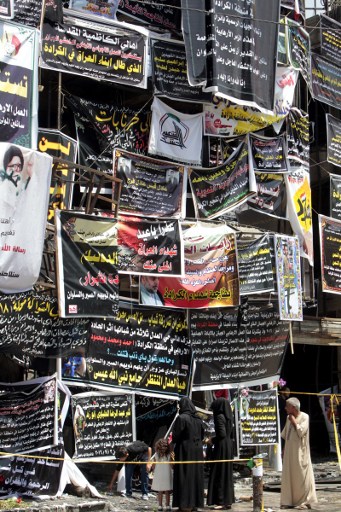30 killed at Iraqi shrine, days after Baghdad blast

Iraqis gather on July 7, 2016 in front of banners of condolences at a memorial for the victims of a bombing which claimed the lives of over 200 people in Baghdad’s Karrada neighbourhood.
Thousands of Iraqis gathered at the site of a Baghdad bombing that killed at least 250 people to mourn the dead and express solidarity with those stricken by the blast. A suicide bomber detonated an explosives-rigged vehicle in Baghdad’s Karrada district early on July 3 as it teemed with shoppers ahead of the holiday marking the end of the holy Muslim fasting month of Ramadan, sparking infernos in nearby buildings. AFP
BAGHDAD, Iraq – Islamic State group extremists attacked a Shiite shrine north of Baghdad, killing 30 people, just days after one of the deadliest ever bombings in the country, a security spokesman said Friday.
The overnight attack on the Sayyid Mohammed shrine in Balad, which involved suicide bombers and gun and mortar fire, also wounded 50 people, the Joint Operations Command spokesman said in a statement.
The attack followed a devastating bombing in Baghdad that tore through a crowded shopping area early on Sunday ahead of the Eid al-Fitr holiday marking the end of the holy Muslim fasting month of Ramadan, killing 292 people.
READ: Death toll in Baghdad bombing rises to 213
The Sayyid Mohammed shrine, located in the Balad area, 70 kilometres (around 45 miles) north of Baghdad, was first targeted with mortar rounds, according to the statement on the attack, which it said it was carried out by the IS jihadist group.
Article continues after this advertisementSuicide bombers then arrived at the shrine and opened fire, it said.
Article continues after this advertisementTwo of the bombers blew themselves up in a market next to the shrine, while the third was killed and his explosive belt defused, it said, without specifying which forces killed the bomber.
The attack came just hours after Iraqi Health Minister Adila Hamoud announced that the death toll from the Sunday bombing had reached 292.
Hamoud said the bodies of 115 killed in the bombing had now been handed over to families, while the identities of 177 others have yet to be determined.
The blast also wounded 200 people, said the minister, who on Tuesday told AFP that the process of identifying the unknown dead — which she put at 150 at the time — was expected to take 15-45 days.
People have been furious over delays in determining the fate of their loved ones, and with the number of unidentified bodies now bigger, it may take even longer.
Lack of emergency exits
The attack has overshadowed what would normally be a joyful holiday for Iraqi Muslims, instead turning it into a time of mourning and sadness.
Investigators now believe they know what caused the attack to claim so many lives.
Police Major General Talib Khalil Rahi said the suicide bomber detonated a minibus loaded with plastic explosives and ammonium nitrate.
The initial blast killed a limited number of people, but flames spread and trapped people inside shopping centres that lacked emergency exits, Rahi told a news conference in Baghdad.
The raging fires have made it difficult to identify the dead.
Interior Minister Mohammed Ghabban tendered his resignation following the bombing, and authorities also announced the execution of five convicts and the arrest of 40 jihadists in an apparent bid to limit the fallout from the attack.
An official in Prime Minister Haider al-Abadi’s office told AFP on Wednesday that the premier had accepted the minister’s resignation, though there has been no official statement from him on the matter.
Sunday’s bombing was claimed by IS, which has its roots in the insurgency that began after the overthrow of Saddam Hussein in the 2003 US-led invasion.
IS overran large areas north and west of Baghdad in 2014, but Iraqi forces have since regained significant territory from the jihadists.
In response to the battlefield setbacks, the Sunni extremist group has hit back against civilians, and experts have warned there may be more bombings as the jihadists continue to lose ground.